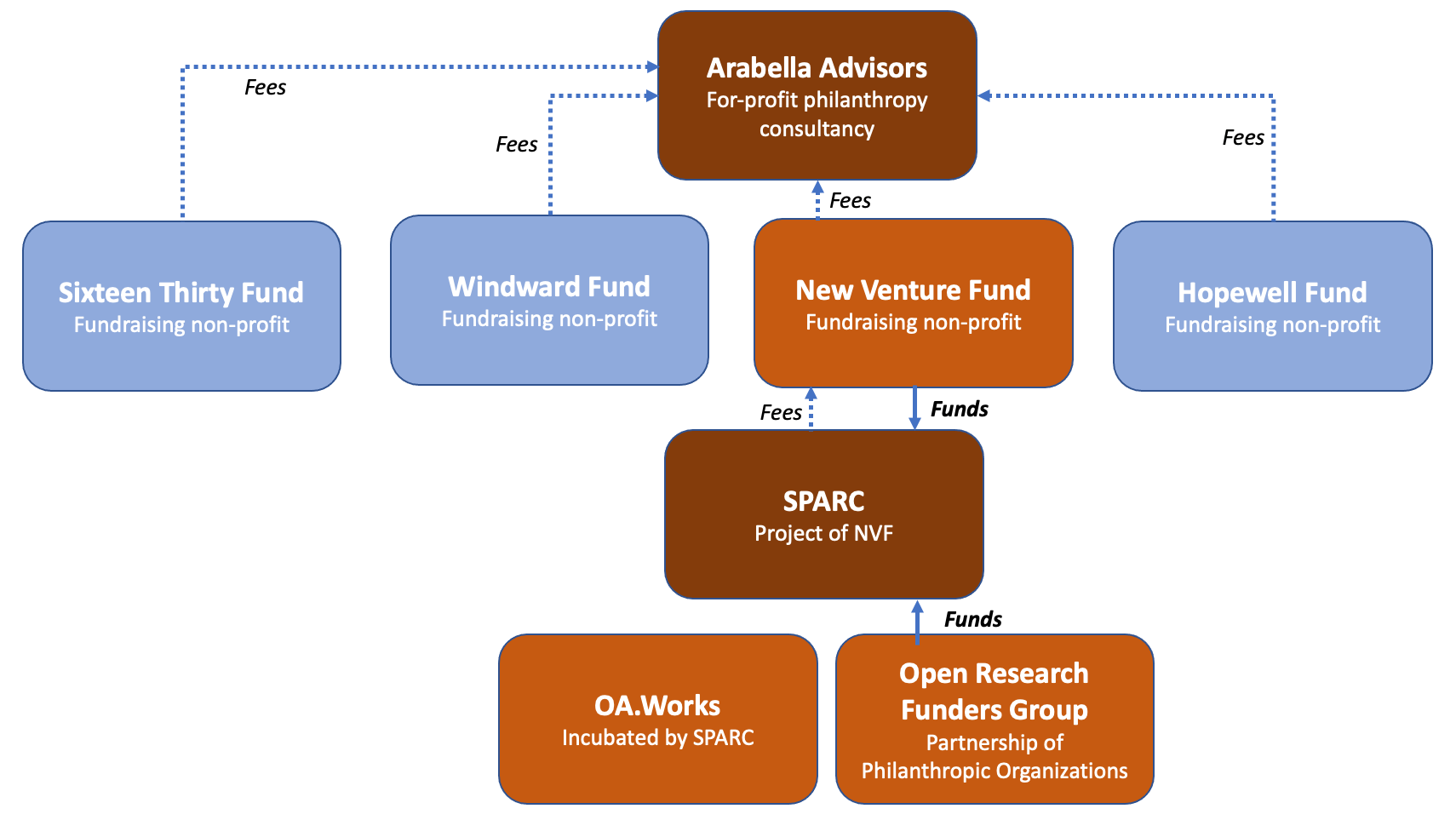A Board Seat, Then a Top Donor
Exploiting a conflict-of-interest at SPARC seems to have paid dividends
Earlier this week, after an in-depth review of SPARC, its position within part of a major “dark money” depository, its lack of disclosure, and the credibility crisis this poses for an organization hectoring everyone to be transparent and open, I wrote about a previously undisclosed conflict of interest for SPARC’s Executive Director, Heather Joseph, who serves on the Board of one of SPARC’s major funders, the Arcadia Fund.
This conflict has apparently paid dividends for SPARC. Since Joseph joined the Board in 2019, the Arcadia Fund has become SPARC’s largest donor, contributing more than $2.3 million in grants for 2020-2023, up from $497,000 across the preceding four years.

In a recent interview, Joseph obfuscated the funding of SPARC by claiming that many donors want their giving to remain anonymous. However, tax authorities require disclosure from registered foundations and non-profits. On top of this, some of the best foundations and non-profits publish their grant lists in searchable databases. As a result, it’s possible to discover most, if not all, of SPARC’s funding using these public documents. For example, with only a few hours of work, I could reconstruct 91% of SPARC’s 2020 budget, based on what Joseph told Poydner. With more work, I could probably get it all.
This raises the question about why SPARC doesn’t just disclose its sources and uses of funds.
How much can we see this way? Exploring public records, we can see that when SPARC left ARL in 2014 and started its fiscal sponsorship arrangement with the New Venture Fund (NVF), Joseph was its Executive Director, and was making $161,134 in salary. In 2015, her salary (paid by NVF) jumped to $302,764. It has increased very gradually ever since. We can also see that ARL transferred $1,504,360 to NVF when SPARC moved.
We can also see that Arcadia’s funding of SPARC clicked up in the year after Joseph joined its board.
In the four years prior to 2020, the Arcadia Fund had given $497,000 to NVF and SPARC. Since 2020, the Arcadia Fund has given $2,370,000 to SPARC, much of it destined for OA.Works, which I wrote about this week as well.
This level of funding makes the Arcadia Fund currently the largest donor to SPARC and its initiatives.
The Open Research Funders Group (ORFG)
SPARC consists of at least three entities:
- SPARC
- OA.Works
- The Open Research Funders Group (ORFG)
The last of these is a panel of funders. Its relationship to SPARC seems to mirror NVF’s relationship to SPARC — a fundraising entity designed to pump money from big donors into SPARC. Big money from above, big money from below.

As a refresher, NVF came out of Arabella Advisors, a for-profit, Washington, D.C.-based philanthropy consulting company. Arabella founded NVF in 2006.
Arabella and NVF are linked to what OpenSecrets.org calls “liberal ‘dark money’ groups,” raising money for political campaigns and PACs. This involves NVF and other Arabella-associated non-profits.
SPARC has always relied on donors, as the $1.5 million carryover from ARL shows. There’s nothing improper about that, if you disclose things and avoid conflicts of interest.
With ORFG, SPARC seems to be mimicking its parent by designing itself to become a money machine catering to big dollar donors.
ORFG was founded in 2015, after a meeting convened by SPARC and the Robert Wood Johnson Foundation, which funded the get-together with a $75,600 grant.
Since 2017, ORFG has generated at least $525,000 in donations to SPARC (via NVF) from the Laura & John Arnold Foundation (since converted into an LLC), the John Templeton Foundation, the Leona M. & Harry B. Helmsley Charitable Trust, the Rita Allen Foundation, the William & Flora Hewlett Foundation, the Gordon & Betty Moore, and the Alfred P. Sloan Foundation.
What Are Our Priorities?
The priorities of SPARC are advocacy and fundraising. That’s normal and natural for such an endeavor. What’s wrong here are the equivocations, a conflict of interest, and the hypocrisy once again of an organization hectoring publishers for openness and transparency while refusing to answer even basic questions about sources and uses of funds, governance controls, and more.
I find this all depressing. SPARC has drifted into a zone of unaccountability and arrogance — a zone that blinds their leadership to acts of self-preservation, the unpleasant optics of hobnobbing with wealthy donors, and hypocrisy about transparency and openness.
The pen is mightier than the sword. This attracted me to writing first, which evolved to a love of strong professional journalism, and then to scholarly and scientific publishing. The reasons run deep — the clarion call to speak truth to power, the unabashed rejection of cronyism, and the enshrinement of independence of thought and seeking of truth. I’m sure I’m not alone in this. Most of the professionals in our sphere — librarians, publishers, editors, and more — seem motivated similarly. In these endeavors, integrity matters.
Yet, with SPARC, we see cronyism, unchecked power and money, and the pursuit of goals that brush aside truth and independence in order to achieve some vague utopian state. As a result, scholarly and scientific publishing is edging more and more toward becoming a plaything of governments, powerful individuals, and those who cater to them, such as SPARC.
Abdicating the basic role and institutional responsiblities of the professional, expert, trusted intermediary seems to be backfiring on us and society, as people lose faith in our ability to do the job they assume we will do — speak truth to power, reject cronyism, protect independent thought, and seek the truth.
SPARC is part of a world exploiting the aftermath of Citizens United, and is behaving as you’d expect a “dark money” processing organization would. It is catering to big money and establishment power. Its work may damage democratic norms and expert information outlets. Its leadership equivocates and obfuscates. It doesn’t live up to the ideals it espouses. It needs reform.
But does anyone care?
If you want to support independent examinations of the scholarly publishing ecosystem, please subscribe today. Subscribe below or inquire at contact@caldera-publishing.com for large group subscriptions. Thank you.